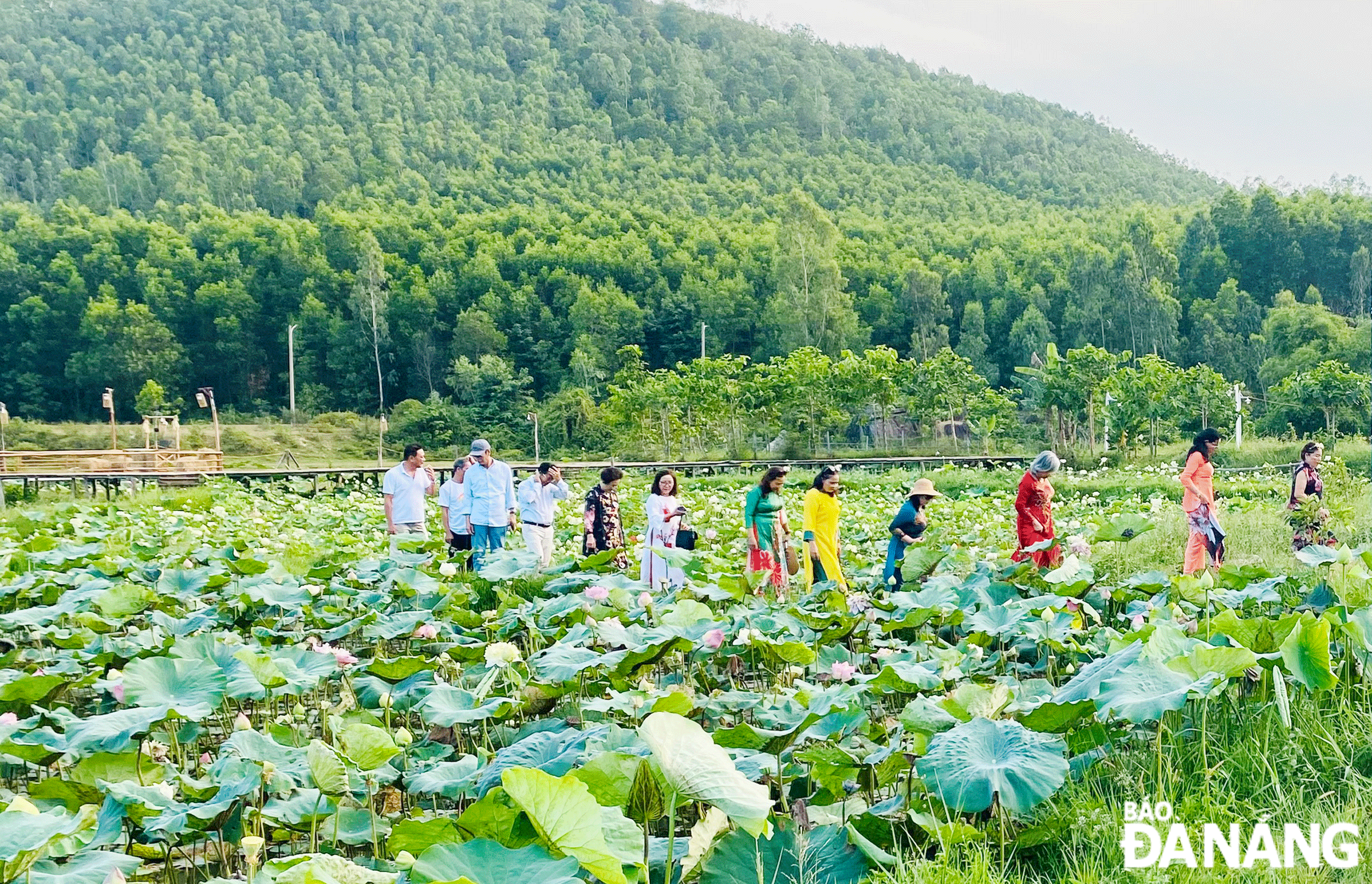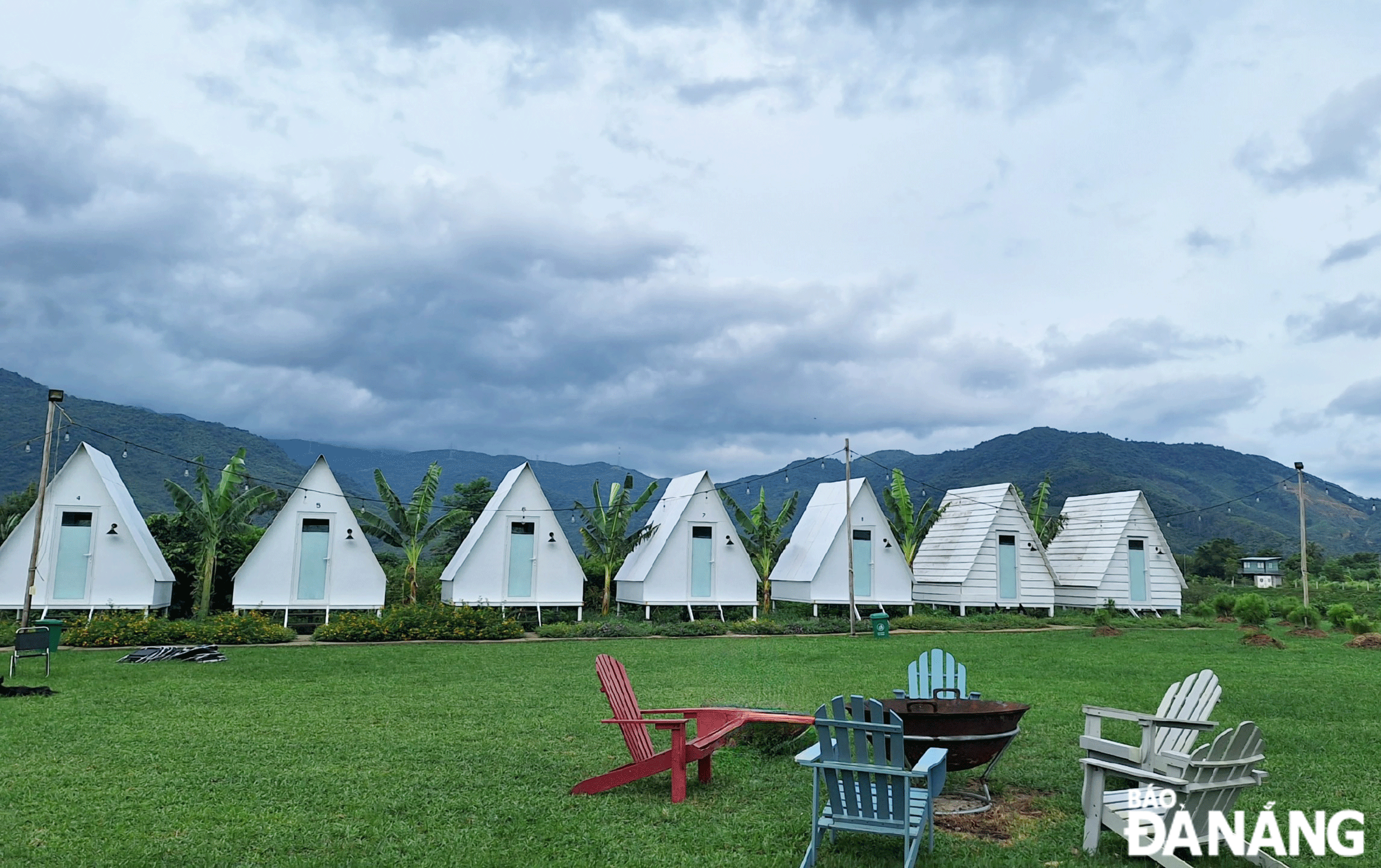Agritourism: A growing trend in Da Nang
Agricultural tourism is a growing trend in Da Nang which offers city dwellers a chance to escape urban concrete and re-discover their rural roots, as well as creates jobs for local farmers. However, it is necessary for the city to ensure the criteria for sustainable agricultural tourism development.
 |
| Getting back to nature and experiencing practical activities are being chosen by many people and tourists. IN PHOTO: Tourists have fun and take pictures at the Lotus Farm. Photo: THU HA |
On weekends, eco-tourism and community-based sites in communes of suburban Hoa Vang District become ideal destinations for local people and tourists to experience.
At the Lotus Farm located in Truong Dinh Village, Hoa Lien Commune, Mrs. Truong Thuy Nga's children, residing in Hai Chau District, watched bees make honey, nurtured seedlings, and played outdoor games.
Mrs. Nga shared that taking part in outdoor activities and exploring beautiful nature contributed to stimulating children's curiosity and discovery. “Hopefully, there will be more experiential places like this in the city for children to come have fun and learn” she added.
The Lotus Farm is one of the tourist destinations increasingly favoured by many families, and groups of students. There are many activities close to nature such as wading in streams to catch fish, playing folk games, climbing monkey bridges, catching ducks blindfolded, and participating in agricultural markets.
Mr. Dang Thai Lam, Director of the Truong Dinh Cooperative (Lotus Farm) said, the about 10 ha farm is divided into areas for growing lotus and safe vegetables, and raising bees, chickens and fish. These areas are all designed in a closest-to-nature style.
“Choosing to develop tourism from local agriculture, the Lotus Farm uses 100% local workers, and creates stable jobs for local people. For sustainable development, the farm aims to provide tourists with new and unique experiences in order to help them feel the simplicity and rusticity of the countryside and preserve local cultural features through such exciting activities as farmers' markets and ‘bai choi’ performances. Besides, the farm also trains and guides skills for workers in tourist service activities" Mr. Lam shared.
Along with the Lotus Farm, a number of ecotourism models in Hoa Vang District are operating stably and welcoming a good number of visitors, including the An Phu Farm, the Banarita Glamping Farm, the Nam Yen valley vineyard, and agricultural production area combined with tourism service exploitation by Mr. Nguyen Duc Tung in Hoa Bac Commune.
These models mainly exploit experiential activities of growing vegetables and grapes, making traditional cakes and Quang noodles, harvesting vegetables and fruits, providing extracurricular educational experiences, training skills for students, farm-to-table dining, pick-your-own produce, BBQ parties, camping, kite flying, sports games, and photography.
 |
| Most current models are aimed at experiential activities, growing vegetables, and doing farming. IN PHOTOS: The Nam Yen valley vineyard is being favoured by many people and tourists every weekend. Photo: THU HA |
According to Mr. Do Thanh Tan, Head of the Culture and Information Office of Hoa Vang District, after Resolution No. 82/NQ-HDND dated December 17, 2021 was issued, the district has concretised its policy of developing agriculture in combination with the exploitation of tourism services, aiming to develop agricultural, forestry and aquaculture areas in Hoa Vang District. This, thereby, helps increase the value of the local agricultural economy, creating on-site jobs for rural people, diversifying tourism products for Da Nang, and meeting the entertainment needs of city dwellers and the experiential education requirements of junior and senior high school pupils.
After a period of implementation, the aforementioned models show the effectiveness of integrating service trade into agricultural production, helping agriculture increase its value many times and having great potential in developing an agricultural economy combined with new rural construction in Hoa Vang District.
All models create on-site jobs for about 25-30 local workers (8-10 workers/model on an average), and consume agricultural products and OCOP (one commune one product) products of the district.
In addition, the abovementioned agricultural tourism destinations are meeting the entertainment and picnic needs of pupils and locals well.
Most recently, the Da Nang People's Committee has issued Decision No. 495/QD-UBND dated March 14, 2024 on the plan to implement the rural tourism development programme in building new rural areas in the city to 2025.
Accordingly, the city will lay an emphasis on appealing for social resources, especially the private sector, and local communities, to actively invest in rural tourism development. The purpose is to develop diverse tourism products and services, create jobs for local workers, contribute to restructuring the rural economy and building sustainable new-style rural areas, develop a system of unique, highly competitive destinations and tourism products.
The goal is to complete the mountainous tourism planning and water entertainment area planning in Hoa Vang District by 2025 in order to call for investment in developing experiential and natural ecological tourism products, and standardising rural tourism destinations and products.
Great efforts will be made to form two OCOP tourism products rated 3 stars or higher, and two community-based tourism cooperatives. Also, 100% of tourism facilities will be provided with training courses on necessary skills for tourism, whilst a unique rural tourism linkage network of Hoa Vang District will be established.
Reporting by NHAT HA - Translating by M.DUNG, P.TRA